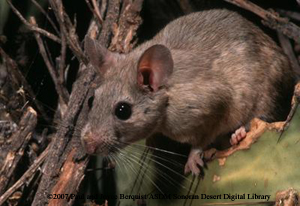Animal Fact Sheet: White-throated woodrat

Identifying Features
The White-throated woodrat (Neotoma albigula) is a medium sized rodent with big ears and eyes, and a furry (rather than hairless) tail. The tail has white fur on the underside and grayish brown fur on top. The hairs on its throat are white, while the rest of its body is gray or tawny. This animal is also commonly called a Packrat.
Adaptations
The large eyes of the packrat help it to see its way around at night, as well as in its dark burrow. The large ears aid in hearing as well as provide a way to lose body heat during the hot months. Packrats obtain most of the moisture they need through their plant diet so they don't require a constant source of fresh water.
Habitat
Packrats are found in a variety of habitats from low desert to pine forests. They will make their homes in burrows, caves, caliche pockets, or in houses constructed of sticks, cactus joints, and other debris.
Range
Packrats occur from the edge of the Arctic Circle to the tropics of Nicaragua, and from western Canada through most of the US and Mexico. The White-throated Woodrat occurs from southern Nevada and Colorado through most of Arizona and Sonora southward.
Wild Status
Packrats are common throughout their range.
Diet
In the wild, packrats eat large amounts of prickly pear cactus, as well as seeds, leaves, and fruit of other plants.
Predators
The packrat is prey for many different animals. Snakes, great horned owls, coyotes, and foxes, are all typical predators.
Home
The typical packrat home is a mound of vegetation and sticks located at the base of a prickly pear cactus or palo verde tree. It has several entries and exits, with tunnels a few inches below ground that have "rooms" for storage and grass-lined nests for sleeping.
Life Span
In the wild packrats live only a few years. In a zoological setting, they have been known to live over 6 years.
Size
Packrats are generally 8 inches in head and body length with a furred tail that is another 5 to 7 inches long. It can weigh up to 1 pound.
Extra Fun-facts
- Packrat nests can get as large a 4 feet high and 8 feet wide because they continually add more nesting materials. They are especially fond of shiny objects and have been known to add keys, tin foil and CD's to their nest. Their nest is known to as a “midden”.
- Although their nest can get to be quite large, it is generally occupied by only one packrat unless it is a mother with young.
 ©Copyright 2008, Arizona-Sonora Desert Museum
©Copyright 2008, Arizona-Sonora Desert Museum